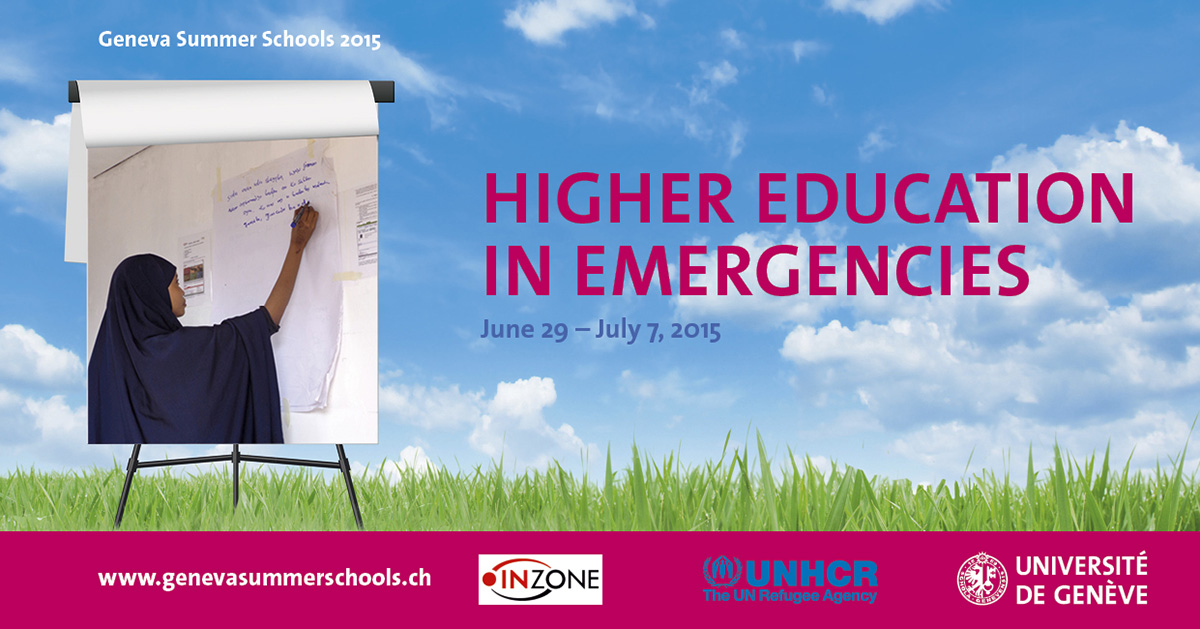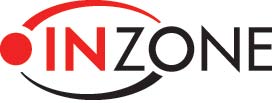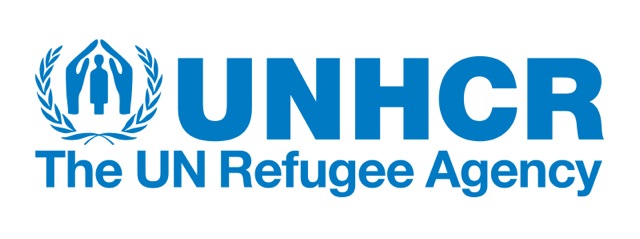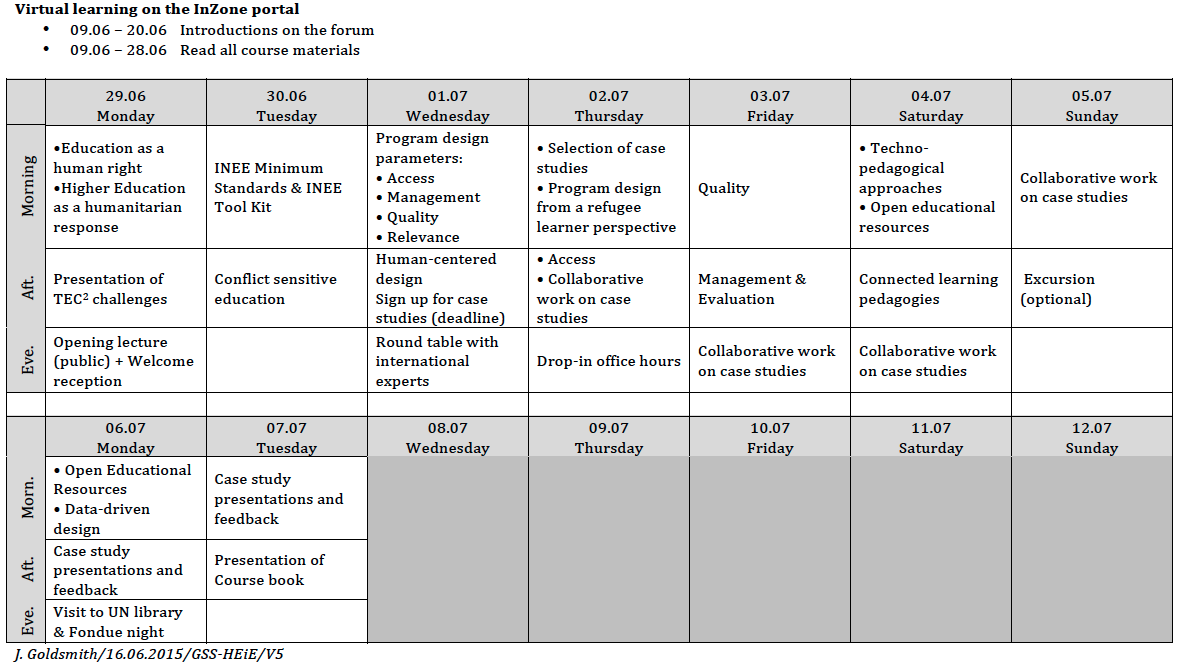
June 29 - July 7, 2015
Download 2015 Course Program
A collaboration between UNIGE-InZone and UNHCR


This course seeks to address the increasing need to provide higher education in emergency and protracted settings. It explores current global crises and opportunities for post-secondary education in fragile contexts. Participants will collaborate with UN agencies, NGOs and educators to discuss policy and programming recommendations, innovative solutions and pedagogical approaches as well as the potential role of universities as humanitarian actors.
COURSE OBJECTIVES
1. Gain a clear understanding of relevant and pertinent international policies that impact education in conflict and crises, with a focus on higher education.
2. Explore, analyze and assess the potential of virtual and connected learning, Open Educational Resources and technology within a structured assessment framework.
3. Apply learner-centered design approaches to complex real-world projects and present solutions to a panel of expert judges.
COURSE DESCRIPTION
This summer school will provide participants with a conceptual framework for Tertiary Education in Conflict and Crises (TEC2) by examining the following topics:
- Education as a human right: Legal ramifications of international education policies
- Higher education as a humanitarian response: Universities as humanitarian actors?
- The education-fragility nexus
- Adaptation of techno-pedagogical approaches to fragile contexts
- Potential of virtual and connected learning, Open Educational Resources (OERs) and Information and Communication Technologies (ICT)
Within this framework, participants will examine design and implementation by focusing on four different, yet interrelated dimensions:
- Access to higher education and techno-pedagogical support, including on-site and virtual tutoring and mentoring schemes;
- Quality of virtual learning in fragility, including learning platforms, curriculum design, teacher and tutor training, accreditation and credentialing schemes, and partnerships with local universities;
- Mapping of higher education domains relevant to these learners within the framework of 21st Century Skills; and
- In-the-field management and implementation models.
Background
Today, there are more refugees and displaced persons than during WWII. The average conflict lasts 10 years, and families remain in internally displaced person (IDP) camps for an average of 17 years. Millions of children and youth in emergency contexts lack access to quality education, which is considered a basic human right under Article 26 of the Universal Declaration of Human Rights.
Humanitarian programming often focuses on life-saving activities by providing food, water, health, sanitation, security and shelter. The failure to prioritize education in general – and higher education in particular – leaves entire generations uneducated, developmentally disadvantaged, and unprepared to contribute to their society’s recovery.
The United Nations High Commissioner for Refugees (UNHCR) views education as a vital means of providing immediate protection to children and preventing human rights abuses. This forward-looking approach sees education as a long-term investment and focuses on integrating refugee children in national schools and rebuilding national education systems. Furthermore, education represents a vital protection mechanism, contributes to political stability, and develops leadership potential in fragile states, fostering the transition from conflict to recovery and from fragility to stability.
Traditionally, education programming has focused on primary education, with more recent work touching on early childhood and secondary education. Yet there have been limited funds and initiatives in higher education, which unleashes innovation, entrepreneurial skills and community development. These are important for social and economic activities and critical for ensuring stability during times of reconstruction as well as longer-term sustainable development.
This course is a collaborative effort building on a recent partnership between UNHCR and InZone/University of Geneva and an outcome of the SNIS Incubator Workshop on Higher Education in Emergenciesheld in 2014. This workshop brought together relevant actors to discuss programs, policies and the scope of tertiary education in conflict and crisis settings, with the goal of bringing academic and scientific rigor to field experience and enhancing access to quality higher education in such settings.
Pedagogical model – Experiential learning
In this course, learners construct knowledge and build expertise in a flipped classroom model. Prior to the course, participants will read course texts and complete the InZone MOOC (Humanitarian Communication – The Last Mile) hosted on Coursera. During the course, this will be enriched through high-level seminars with faculty and field experts before being applied to real-world case studies through collaborative learning, tutoring sessions and project presentations. This approach will help participants experience a pedagogical approach that puts the learner at the center and builds skills and expertise. Simultaneously, they will gain an understanding of how multiple pedagogical resources can be leveraged efficiently and effectively to produce sustainable outcomes in fragile contexts.
Participants will present solutions to real-world case studies to an expert jury for feedback and discussion.
Learning outcomes:
At the end of this course, participants will have developed a conceptual framework to be able to:
- appreciate the potential of TEC2 and understand relevant constraints;
- analyze emergency and protracted contexts to evaluate the potential for implementing TEC2 projects;
- assess the potential of different pedagogical models – including on-site and virtual delivery modes – to contribute to project outcomes and to sustainability; and
- identify the humanitarian actors, including staff and beneficiaries, needed to jointly manage the multiple components of a TEC2 project.

Assessment:
Participants receive continuous formative and summative assessments for individual and collaborative learning activities embedded in the course. Collaborative work on real-work cases will allow them to test their knowledge and skills. Participants will also receive feedback from an expert jury on their solutions.
The course will use the University of Geneva grading scheme.
Academic Credit and Certificates
A certificate of completion will be awarded to those who complete the course.
You may be eligible for 4 ECTS (European Credit Transfer System) credits. Please see further information here.
Academic Director: Barbara Moser-Mercer, Professor, University of Geneva, Director, InZone (Centre for Interpreting in Conflict Zones)
Co-instructor: Jacqueline Strecker, UNHCR Innovation Learn Lab Coordinator
Faculty and speakers comprise field and academic experts from international programs including:
- UNHCR – United Nations High Commissioner for Refugees
- INEE – International Network for Education in Emergencies
- InZone – Centre for Interpreting in Conflict Zones
- JC:HEM – Jesuit Commons: Higher Education at the Margins
- BHER – Borderless Higher Education for Refugees
- Australian Catholic University
- Kenyatta University
- Purdue University
- Coursera
Contact: This email address is being protected from spambots. You need JavaScript enabled to view it.
This course is designed for:
- Humanitarian practitioners
- Graduate students and faculty in international relations, international education, and educational technologies
- Representatives of donor organizations whose mission and mandate includes education and higher education
- Representatives of Education Ministries
APPLICATION PROCESS
Applying early is recommended, as limited spots are available.
All applications will be considered on a rolling basis.
Submit your application using the “Apply” button on the upper right-hand corner of this page.
Final application deadline: May 10, 2015
CHF 2’300
Some scholarships available. Please consult the scholarship policy.
Course costs include:
- tuition
- course readings
- round table with invited international experts
- take-home materials including reports from all course work, which will be presented as a Course Book
- registration for the verified certificate for the InZone MOOC on the Coursera platform
- daily coffee breaks
- one welcome reception
- one fondue dinner
Not included: Accommodation and other meals.
Please note: Changes to the draft program may be made at any time prior to the start of the course.


